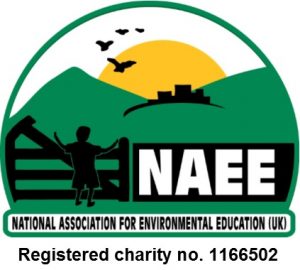 NAAEE is working with partners at Stanford University, the University of Florida, and the Children & Nature Network to get a better sense of how environmental educators and other professionals think about nature. You can help by responding to this short survey.
NAAEE is working with partners at Stanford University, the University of Florida, and the Children & Nature Network to get a better sense of how environmental educators and other professionals think about nature. You can help by responding to this short survey.
Butterfly Conservation says that the Big Butterfly Count is now on, running from July 20th to August 12th. BC wants our sightings to discover which species are thriving and which are simply surviving. Click here to watch wildlife presenter and BC Vice-president, Nick Baker, explain why taking part in the Big Butterfly Count is good for you as well as for our butterflies. You can also download an app or chart to take part. Last year, 60,000 of us took part.
Click here to read about the Communicate 2018 event (The Art of the Possible) which is taking place in Bristol of October 23/24. The organisers say:
“As communicators in a complex, unpredictable world, there is an urgent need for pragmatic, proactive tools to seize on this time of unprecedented social and political change. From plastics to climate change, habitat loss to nature connection, what can we each achieve to collectively engineer the right conditions and identify the catalysts of positive action? What can we learn from exploring the evolutionary history of the issues to help us navigate this complex ecology of change? Discuss, debate, and build a vital communications toolkit for the coming year through two days of inspiring content, cutting edge research, practical workshops and engaging discussion.”
The British Antarctic Survey says that a new study of lake sediments from the sub-Antarctic reveals for the first time that increases in westerly winds are likely to reduce the ability of the Southern Ocean to absorb carbon dioxide from the atmosphere. The results are significant as the Southern Ocean currently absorbs over 40% of human-produced carbon dioxide, so any weakening of this ‘carbon sink’ could accelerate climate change. The findings have been published in the journal Nature Geoscience.’
Think Global has announced that the winner of its 2018 Global Educator of the Year Award is Samantha Olubodun, a teacher and a Specialist Leader in education at Meadow County Primary School, Cheshire. Think Global says that her integration of global learning and the United Nations Sustainable Development Goals (SDGs) into her practice has inspired many.
Sea Watch Foundation has been monitoring whales, dolphins and porpoises in British and Irish waters for over forty years with the help of volunteer citizen scientists who report presence, location and numbers of cetaceans from around the country. For the past 16 years this has been spearheaded through an annual national recording event, the National Whale and Dolphin Watch (NWDW). The event this year is taking place from Saturday 28th July until Sunday 5th August 2018 and it marks the long-lasting collaboration between citizen scientists, wildlife enthusiasts, the general public and researchers alike.
Here’s more detail of Connecting Classrooms through Global Learning [CCGL] which is led by the British Council and will begin in the autumn to replace both the GLP and the British Council’s Connecting Classrooms. BC says that CCGL is designed to help build long-term relationships between schools and communities in the UK and developing countries. The aim of CCGL is to equip pupils in both the UK and developing countries with the knowledge, skills and attitudes to live and work in a global economy and to take action on global issues.
Here’s a reflection from DERC on the outcomes of the 5 years of funding for the GLP.
September 15th sees an exploration of the achievements of the Woodcraft Folk over 100 years. You can register here. The organisers say:
“Education for Social Change examines the organisation’s long-standing and innovative engagement with children and young people. Woodcraft Folk’s aim, since its inception, has been to utilise education as a tool for social change towards the ‘fashioning of a new world’. The symposium will evaluate these contributions, examining how the practices of Woodcraft Folk have framed the experience of childhood and adolescence over the last century, often in opposition to prevailing social and cultural norms, and, equally importantly, it will explore how children and young people have articulated their identities and experiences inside the organisation over the same period. In so doing, the symposium will examine the place of Woodcraft Folk within a broader set of progressive educational approaches and also its distinctiveness in how these ideas were (and are) understood and acted upon. Crucially, the symposium will explore not only the successes and achievements of the organisation but also, in the spirit of critical engagement with the archive and histories, those times when Woodcraft Folk failed in its ambitions or struggled to meet the challenges of changing values.”
